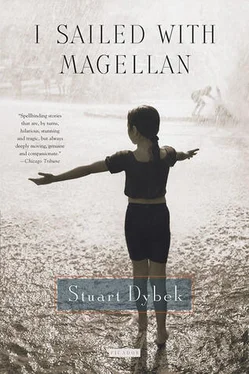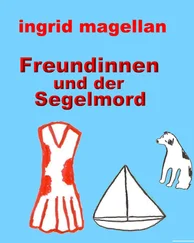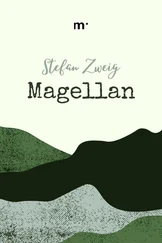They stood stalemated, nobody on the street paying the least attention, the gypsy massaging the front of his trousers while Sir tried to work her hand out of his back pocket without the wallet coming with it. I just stood there, too, instantly entranced by her, until I saw two gypsy men stepping out of the same doorway toward my father.
A cop, gnawing a Polish sausage dripping sauce, ambled across the street and headed them off.
“Giving you trouble?” he asked Sir.
“Forget it,” Sir said, face still registering a sour taste. “I don’t want no trouble.”
As we walked away, I turned and saw the cop slip his arm around the girl’s shoulder, taking a bite from the sausage he held in one hand while his other hand nonchalantly slid into her blouse so that a bare breast almost lifted over the elastic neckline, flashing the tan areola of a nipple I didn’t quite see. I watched the girl disappear back into the doorway of the storefront. Sir caught the look on my face.
“They get you inside there and shlish,” he said, drawing a finger across his throat. “Girls like that carry a disease that’ll make you walk like Charlie Chaplin.”
It was the first advice he ever gave me about sex and, thankfully, the last.
We saw the Chickenman that day, stilt-legged, balanced on a hydrant above the passing crowds, with the chicken rising from his head like a weather vane. The bird hopped to his shoulder, and the man’s mouth widened to a gaping hole in which the chicken bobbed his head. The mouth closed, and when the chicken slowly spread its wings, it looked as if the man’s head might fly from his body.
I’d described the whole scene more than once to Mick on nights when I’d lie in the dark and think about the girl before I went to sleep, wondering where the gypsies had gone. Mick especially liked the part about her grabbing Sir by the balls.
We knew we were close when we passed Donnelly’s, a block-long factory where telephone books were printed. I could feel the pneumatic exhalation of its giant, racketing presses, smell the scorched ink of all those compressed names and numbers and the sweat of the night shift, who stared out like convicts behind mesh screens. Then traffic accelerated, and as we pulled onto the Outer Drive the sudden coolness made my head light. Soldier Field rose on the left, and the lake stretched past the breakwater and farthest sailboats, shimmering pink under a sun that glazed the park trees.
“Workin on the railroad, workin on the farm, all I got to show for it’s the muscle in my arm,” Sir sang in a voice he lowered to a baritone he considered operatic. He often sang when he drove. “I had a Caruso-quality voice as a kid,” he’d tell us, “but ruined it imitating trains.”
Mick was rolling around in the backseat with his hands over his ears, groaning as if having convulsions.
“At least he’s not singing ‘Brother Can You Spare a Dime?’” I said.
“And it looks like I’m never gonna cease my wanderin.”
“He’s never gonna cease his wanderin,” I said to Mick.
Mick and a black kid in the backseat of a car in the lane beside us were giving each other the finger. The kid tried to spit into our Kaiser, but his spit blew back on him. We all busted up, including the kid.
Sir was pumping the brakes as cars weaved in front of him.
“Da-damn nuts,” he yelled, jockeying for the turning lane. “It’s really dog eat dog on this thing.”
Brakes grinding, we shimmied off the exit for Twelfth Street Beach and crawled along the aisles of the parking lot looking for a space. Finally, Sir had to drive over the sidewalk and park on the grass. There were a lot of other cars parked on the grass.
“Can’t give us all tickets,” he said.
We slipped our jeans off. Sir hid his watch and wallet under the seat.
“Leave the windows open a crack, so when we come back it’s not like a da-damn oven in here.”
“Where’s the door opener?” Mick asked.
“Just climb out this way,” Sir said.
“No,” Mick insisted, “I demand the door opener.”
I handed it to him over the seat, and he began to mash at the buffalo. Only the door on the Kaiser’s driver side opened, so we carried around a sawed-off broom handle we called the door opener. The Kaiser had no inside door handles. Before the Kaiser-Frazer company went out of business, it had advertised its designs as the automobiles of the future. To their engineers, the future meant push buttons, so they’d replaced door handles with push buttons embossed with the Kaiser trademark, a buffalo. By mashing the buffalo with just the right amount of force, we sometimes got the passenger door to open. We’d turned it into a competition. This time Mick got it on five tries — average.
Sir checked to make sure everything was locked while Mick and I hopped barefoot across scorching asphalt to the beach.
“Don’t step on any da-damn broken glass or we’ll have a real mess,” Sir hollered behind us. “I don’t know why the punks have to break the bottles instead of throwing them in the trash.” He paused to kick a bottle neck through a sewer grate. He was still wearing his socks and unlaced factory shoes, though he’d stripped down to his old maroon bathing trunks with the gold buckle and the leaping aqua blue swordfish over the coin pocket. People didn’t wear swimsuits like that anymore. Sometimes seeing it made me weak inside with a feeling that I couldn’t name but that had to do with all the times I’d seen him wear it before, times when I was little — younger than Mick was now — when Moms would always come with us to the beach, times before she got nervous, before we’d hear her pacing the house in the dark in the middle of the night crying to herself. Seeing the maroon bathing suit made me think of the old maroon Chevy, the first car I remembered. I thought my father had driven home from the Army in it. It had a running board he’d let me ride on while he parked.
It was a car we’d pack once a year with shopping bags full of old clothes and jars of jam and the dill pickles Moms canned. Leaving Moms behind, my father and I would drive a long time into what seemed to me to be countryside because the streets were shadowy with trees. We’d arrive at a high iron gate and follow a road that curved through park-like grounds where people in wheelchairs were pushed by attendants in white. We’d park and enter a cavernous building of gray stone, tote our shopping bags down corridors acrid with disinfectant, and wait before a bank of windows that looked out on lawn. An old man with stunned eyes and a jawline grizzled in gray would be wheeled in to where we waited. The three of us would sit silently together. There was never any talk, not even in Polish, a language my father relied on for secrecy. My father took the old man’s veined, stony hand and traced its battered knuckles. Before we left he’d kiss that hand. We never stayed long, and I’d forget about our trip until a year later, when we’d again load shopping bags into the maroon Chevy and drive into what felt like a déjà vu.
After a few such visits I asked, “Dad, who is that old guy?”
“Grandpa,” he answered, the only time I ever heard him use the word. After that we never went back. If my father continued to visit, he did so secretly. Only later did I learn that the place to which we drove was Dunning, the state mental hospital that people then commonly called the insane asylum.
The beach house was shaped like an ocean liner with a huge orange smokestack. Lights glowed from its portholes; the air smelled like red hots and popcorn. People padded barefoot through sandy puddles slopped along the concrete decks, shouting in different languages. Men showered in open stalls in front of changing rooms, spraying sand off kids little enough to go naked.
Читать дальше












